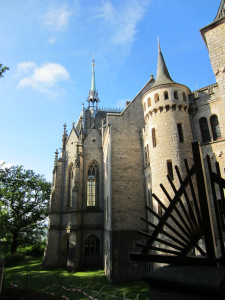For the Love of Castles: Marienburg
- Feb 19, 2017
- 3 min read

Due to this posting being so close to September 11th, I thought it best to provide an article depicting something beautiful instead of delving into that of crime. As such, welcome to Castles, my monthly column where we explore different historical castles, fortresses, and palaces.
When it comes to writing any sort of historical fiction, you have to have a feeling of being immersed in the time-period chosen. If you’ve been following my column and or writings for any amount of time, I’m sure you’ve come to find that I am enthralled with the German culture and Germany. While living abroad, I came to love the language, culture and people. Surrounded by history, each day added to my ever growing imagination. The village I lived in was settled in 1022, and the nearby city in 953. While walking through older parts of the city, I often found houses and historical buildings with facades containing old German handwriting (Altdeutsche Schriften) and paintings. It was interesting to take the time to decipher what was written on those walls. To be surrounded by old city stone walls, walk on cobblestone paved streets, and view castle ruins all while shopping. I loved (and often miss) it.
Germany is a country rich in history, and for lovers of all things palatial, I’m excited to share some more of my great findings. Today, we continue our exploration in Lower Saxony, traveling approximately 30 minutes south of Hanover to Pattensen.
Marienburg Castle is a beauty to behold. If I could create my own version of Downton Abbey, but set it during the Victorian era, surely, I’d use something as grand as this! If you like turrets and Gothic facades, with rolling green hills, then add this location to your travel plans.
According to the castle’s official site, Marienburg is the “former summer residence of the Royal House of Guelph.”
To step on the grounds of Marienburg is to almost step back in time, before the 1871 unification of what is now Germany. George V was the last of the kings, and the Guelph (also known as Welf), is the “oldest royal dynasty in Europe.”
Built as a gift from George V to his wife, Marie of Saxe-Altenburg, Marienburg’s beautifully landscaped grounds make you think of fairy tales, happy endings and the beauty of love. Maybe it is the romantic in me, or maybe I’ve read too many romance novels (no such thing as reading too many), but there is something quite charming about a man willing to gift such beauty on his wife, in her honor. Although blind, George V had great vision of what was beautiful.
Interesting fact from Wikipedia: “Upon the death of William IV … the Duke of Cumberland succeeded to the Hanoverian throne as Ernst August I, and Prince George became the Crown Prince of Hanover. As a legitimate male-line descendant of George III, he remained a member of the British Royal Family, and second in line to the British throne, until the birth of Queen Victoria’s first child, Victoria, Princess Royal, in 1840.“
If the German states hadn’t operated under the Salic Law of Succession then it is likely that the British Queen Victoria could have been the Queen of Hanover.
Of course, another interesting tidbit is the fact that George V was at one time suggested to marry his cousin, Victoria. I wonder what happened and why they never married? Sounds like great historical details for another book down the road.
My friend, Beate Boeker, a romance and mystery author, has kindly provided pictures of this lovely and romantic castle for your viewing pleasure.
Thanks for joining me on this adventure, and please enjoy a little bit of Johannes Brahms!
[youtube https://www.youtube.com/watch?v=DeGS8ocQ4pQ]
__________
Tina Glasneck enjoys creating tales that stir the heart. She is currently working a her time-travel romance, which has her falling in love with her hero and suffering from bouts of Wanderlust, longing for the North Sea. www.TinaGlasneck.com
Beate Boeker has been a traditionally published author since 2008 with a passion for books that brim over with mischief & humor. Widely traveled, she speaks German (her mother language), English, French and Italian and lives in the North of Germany together with her husband and daughter. While ‚Boeker‘ means ‚books‘ in a German dialect, her first name Beate can be translated as ‘Happy’ . . . and with a name that reads ‘Happy Books’, what else could she do but write novels with a happy end? www.happybooks.de














































Comments